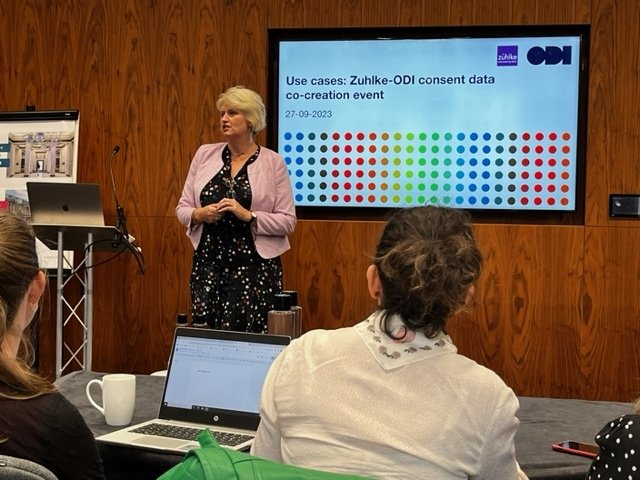Consumers share their data with a wide range of organisations when they purchase or receive services. But while there are regulations and ethical guidelines about sharing personal data, relatively little thought has been given to situations where sharing data about consumers can benefit them.
In April 2023 Zühlke, a global innovation service provider, completed an Innovate UK-funded research project on the importance of consent data and the opportunities to work with it. As a follow up to this work Zühlke and the ODI held a creative workshop to explore how an open, trustworthy data ecosystem could support the ethical sharing and reuse of consent data.
The Zühlke ODI creative workshop

The group of data professionals, the majority of whom identified as female, gathered in London, to share ideas about the kind of ecosystem that might be required to make better use of consent data.
To kick things off, the ODI team introduced an approach that considers the economic or social value brought to an ecosystem when data is shared.
Next Dan Klein, Zühlke's Head of Data & AI, talked through the challenges his team faced when developing the NHS Covid 19 App, described as a consensual digital twin. Dan explained that by working with privacy campaigners and security experts, alongside representatives from vulnerable groups, Zühlke was able to create a compliant solution that protected users, and crucially had community support for adoption at scale. As reported in Nature, this thoughtful use of personal and consent data, prevented over 1 million Covid-19 cases; kept 44,000 out of hospital and saved over 9,000 lives.
Attendees at the workshop then used the Data Ecosystem Mapping Tool, a technique developed by the ODI, to work through their own use cases, where putting consumers in control of how their data is used could deliver substantial benefits.
Use cases discussed included:
- Sharing smart meter data to support vulnerable users living alone.
- Sharing data about children on risk registers as they turn eighteen to ensure they continue to receive support.
- Sharing data about vulnerable users to prevent fraud.
- Tracking the consumption and use of FMCG goods through retailers’ systems to develop a relationship with the end customer.
There is clearly more to do in this area and the potential to change multiple industries and user experiences. Thank you to Zühlke for hosting the event. We look forward to the next one.